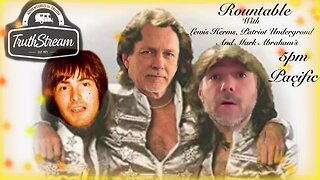Premium Only Content

God's Chosen People
Skeptics may think the Bible is too difficult to interpret, but the more one actually reads and follows it, the more understandable it becomes. A marketplace conversation with a Jewish man, Noah, got me thinking about one difficult passage that is only now starting to make sense to me. It is an incredible statement made by another Jew – the Apostle Paul – about the fact that his own people had not embraced Jesus as their Messiah:
Paul wrote “I have great sorrow and unceasing anguish in my heart. For I could wish that I myself were cursed and cut off from Christ for the sake of my people, those of my own race, the people of Israel. Theirs is the adoption to sonship; theirs the divine glory, the covenants, the receiving of the law, the temple worship and the promises. Theirs are the patriarchs, and from them is traced the human ancestry of the Messiah, who is God over all, forever praised! Amen.” (Romans 9)
What I have found so incomprehensible about this statement is that it seems as if Paul would be willing to give up even his own salvation for the sake of his fellow Jews!
Now I feel much the same sense of anguish and sorrow for all lost people – both Jew and Gentile – that Paul felt. But I’d be lying if I said I’d be willing to give up my own salvation for them.
In fact, I’d also be lying if I said that it is this sense of sorrow and anguish that drives me to regularly “put myself out there” and risk ridicule and worse for the salvation of others. “Saving people” really isn’t my motivation at all, because that’s something only God can do. How do I know? Paul himself wrote the rest of Romans 9 about that very fact – that it is God’s sovereign choice upon whom he will show compassion and mercy and whom He will not. Vs. 18 reads: “God has mercy on whom he wants to have mercy, and he hardens whom he wants to harden.”
Why then, would I go out to initiate Gospel conversations if it doesn’t make a difference in God’s sovereign plan of election? Because God’s glory through our obedience is also a part of His sovereign plan. We obey Jesus’ command to proclaim the Gospel because He is worthy and we want Him to be glorified. Paul gave a clue about that very motivation toward the end of his description of the advantages the Jews had as God’s chosen people: “…and from them is traced the human ancestry of the Messiah, who is God over all, forever praised! Amen.”
Paul glorifies God in that statement, and then in the rest of Romans 9 explains the wisdom of God’s plan of salvation not necessarily for the physical descendants of Abraham (“the people of Israel”) but for all who believe in Jesus, whom he calls the “children of the promise”. Paul affirms in this chapter that he really couldn’t give up his salvation, that it is not something we humans can give or take. It is entirely in God’s hands. This leads me to believe that Paul merely made this statement for emphasis as to how serious the matter of salvation is, and how much sorrow and anguish he felt that so many Jews had abandoned the very gift that God brought through them to the world in the first place.
So where does that leave me, a Gentile Christian, after talking with Noah, an unbelieving Jew? Well, it was a very short conversation, made even shorter because his wife was waiting for him and I wanted to respect their time. But in that short dialog I found out that not only has Noah rejected Jesus as the Messiah, he also rejects belief in God’s existence altogether. He talked much of trying to do good in this life, but rejects the idea of any kind of existence in a life to come. Toward the end I tried to respectfully ask what the difference would be between himself and an atheist, and he wisely said that he tries to avoid labels or categorizing people’s beliefs.
But there is a difference between a Jew who rejects belief in God, and an atheist who did not grow up in a Jewish home, and Paul described it well when he talked about all the advantages Jews have had in the above passage. Neither the atheist nor the unbelieving Jew believe in God but the difference would be that the atheist may not necessarily have been given every advantage to believe like the unbelieving Jewish man had.
I left the conversation feeling like I had at least given Noah a friendly reminder of the advantages he’s had growing up Jewish. I hope I gave a nudge in the direction of faith that glorifies God and could even be used by God in His sovereign plan for Noah. Maybe Paul’s incredible statement of willingness to give up even his own salvation helped me to see the importance of eternity and inspired me to reach out with the Gospel with at least some of the urgency as Paul had. And maybe, just maybe, I’m beginning to understand yet another difficult passage of the Bible.
-
 2:18:42
2:18:42
TheSaltyCracker
4 hours agoUkraine Pokes The Bear ReeEEEStream 06-01-25
91K261 -
 2:45:56
2:45:56
IsaiahLCarter
6 hours agoAPOSTATE RADIO 016: WPATH's Pseudoscientific Insanity (feat. Mia Hughes)
37.1K1 -
 LIVE
LIVE
TheBeardedNerdd
4 hours ago🔴 LIVE- (Splitgate 2) Gaming with CRGOODW1N Streamer/Creator W/ @SelfmadeGGs
256 watching -
 2:11:47
2:11:47
TruthStream with Joe and Scott
1 day agoRoundtable with Lewis Herms, Mark Abrahams and Patriot Underground live #335
32.5K4 -
 4:33:49
4:33:49
EricJohnPizzaArtist
5 days agoAwesome Sauce PIZZA ART LIVE Ep. #49: Rumble Gaming Night featuring Scottish Viking Gaming!
32.3K3 -
 LIVE
LIVE
Misfit Electronic Gaming
7 hours ago $0.38 earned"LIVE" Playtest Sunday Funday Join me in testing "Rotten Sails" & Maybe some "Empyrion"
109 watching -
 LIVE
LIVE
CassaiyanGaming
13 hours ago12-Hours of Call of Duty | Sunday at 11am
23 watching -
 13:23
13:23
Exploring With Nug
1 day ago $0.38 earnedWe Recovered A Stolen Truck From The Swamp!
57.5K6 -
 28:59
28:59
Athlete & Artist Show
7 hours ago $1.44 earnedFlorida Panthers Sweep Oilers in Stanley Cup Final?
30.1K2 -
 1:09:12
1:09:12
Adam Does Movies
1 day ago $1.51 earned31 On 31 - Law & Disorder Edition - Ranking 31 Mob Movies!
30.6K3